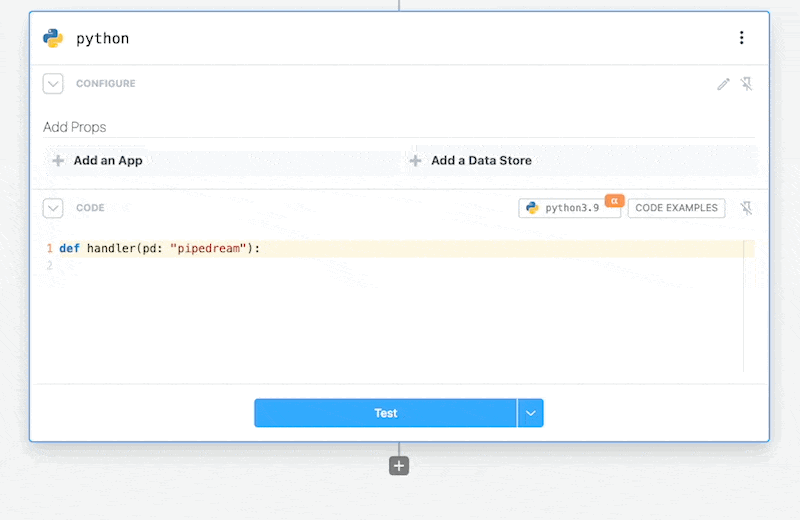# Using Data Stores
WARNING
This is an experimental feature and is available to to enable or disable in the alpha (opens new window).
There may be changes to this feature while we prepare it for a full release.
In Python code steps, you can also store and retrieve data from Data Stores without connecting to a 3rd party database.
Add a data store as a input to a Python step, then access it in your Python handler with pd.inputs["data_store"].
def handler(pd: "pipedream"):
# Access the data store under the pd.inputs
data_store = pd.inputs["data_store"]
# Store a value under a key
data_store["key"] = "Hello World"
# Retrieve the value and print it to the step's Logs
print(data_store["key"])
# Adding a Data Store
In the inputs select the Add Data Store option.

This will add the selected Data Store to your Python code step.
# Saving data
Data Stores are key-value stores. Saving data within a Data Store is just like setting a property on a dictionary:
from datetime import datetime
def handler(pd: "pipedream"):
# Access the data store under the pd.inputs
data_store = pd.inputs["data_store"]
# Store a timestamp
data_store["last_ran_at"] = datetime.now().isoformat()
# Retrieving keys
Fetch all the keys in a given Data Store using the keys method:
def handler(pd: "pipedream"):
# Access the data store under the pd.inputs
data_store = pd.inputs["data_store"]
# Retrieve all keys in the data store
keys = pd.inputs["data_store"].keys()
# Print a comma separated string of all keys
print(*keys, sep=",")
# Checking for the existence of specific keys
If you need to check whether a specific key exists in a Data Store, use if and in as a conditional:
def handler(pd: "pipedream"):
# Access the data store under the pd.inputs
data_store = pd.inputs["data_store"]
# Search for a key in a conditional
if "last_ran_at" in data_store:
print(f"Last ran at {data_store['last_ran_at']}")
# Retrieving data
You can retrieve data with the Data Store by key name:
def handler(pd: "pipedream"):
# Access the data store under the pd.inputs
data_store = pd.inputs["data_store"]
# Retrieve the timestamp value by the key name
last_ran_at = data_store["last_ran_at"]
# Print the timestamp
print(f"Last ran at {last_ran_at")
Alternatively, use the data_store.get() method to retrieve a specific key's contents:
def handler(pd: "pipedream"):
# Access the data store under the pd.inputs
data_store = pd.inputs["data_store"]
# Retrieve the timestamp value by the key name
last_ran_at = data_store.get("last_ran_at")
# Print the timestamp
print(f"Last ran at {last_ran_at")
TIP
What's the difference between data_store["key"] and data_store.get("key")?
data_store["key"]will throw aTypeErrorif the key doesn't exist in the Data Store.data_store.get("key")will instead returnNoneif the key doesn't exist in the Data Store.data_store.get("key", "default_value")will return"default_value"if the key doesn't exist on the Data Store.
# Deleting or updating values within a record
To delete or update the value of an individual record, assign key a new value or '' to remove the value but retain the key.
def handler(pd: "pipedream"):
# Access the data store under the pd.inputs
data_store = pd.inputs["data_store"]
# Assign a new value to the key
data_store["myKey"] = "newValue"
# Remove the value but retain the key
data_store["myKey"] = ""
# Deleting specific records
To delete individual records in a Data Store, use the del operation for a specific key:
def handler(pd: "pipedream"):
# Access the data store under the pd.inputs
data_store = pd.inputs["data_store"]
# Delete the last_ran_at timestamp key
del data_store["last_ran_at"]
# Deleting all records from a specific Data Store
If you need to delete all records in a given Data Store, you can use the clear method.
def handler(pd: "pipedream"):
# Access the data store under the pd.inputs
data_store = pd.inputs["data_store"]
# Delete the entire contents of the datas store
data_store.clear()
WARNING
data_store.clear() is an irreversible change, even when testing code in the workflow builder.
# Viewing store data
You can view the contents of your data stores in your Pipedream dashboard (opens new window).
From here you can also manually edit your data store's data, rename stores, delete stores or create new stores.
# Workflow counter example
You can use a data store as a counter. For example, this code counts the number of times the workflow runs:
def handler(pd: "pipedream"):
# Access the data store under the pd.inputs
data_store = pd.inputs["data_store"]
# if the counter doesn't exist yet, start it at one
if data_store.get("counter") == None:
data_store["counter"] = 1
# Otherwise, increment it by one
else:
count = data_store["counter"]
data_store["counter"] = count + 1
# Dedupe data example
Data Stores are also useful for storing data from prior runs to prevent acting on duplicate data, or data that's been seen before.
For example, this workflow's trigger contains an email address from a potential new customer. But we want to track all emails collected so we don't send a welcome email twice:
def handler(pd: "pipedream"):
# Access the data store
data_store = pd.inputs["data_store"]
# Reference the incoming email from the HTTP request
new_email = pd.steps["trigger"]["event"]["body"]["new_customer_email"]
# Retrieve the emails stored in our data store
emails = data_store.get('emails', [])
# If this email has been seen before, exit early
if new_email in emails:
print(f"Already seen {new_email}, exiting")
return False
# This email is new, append it to our list
else:
print(f"Adding new email to data store {new_email}")
emails.append(new_email)
data_store["emails"] = emails
return new_email
# Data store limitations
Pipedream Data Stores are currently in Preview and are subject to change.
Data Stores are only currently available in Node.js code steps. They are not yet available in other languages like Python, Bash or Go.
# Supported data types
Data stores can hold any JSON-serializable data within the storage limits. This includes data types including:
- Strings
- Dictionaries
- Lists
- Integers
- Floats
But you cannot serialize Modules, Functions, Classes, or other more complex objects.
